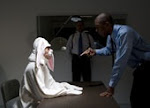2 men get 4 years in prison for $240M tax scheme
Associated Press
SEATTLE (AP) - Two Seattle-area men were sentenced Friday to four years in prison for concocting a bogus tax shelter to help a Hollywood mogul, the owner of the New York Jets and other wealthy clients avoid paying $240 million in payments.
Jeffrey Greenstein, 48, was the founder and chief executive of the boutique investment firm Quellos Group LLC, and Charles Wilk, 52, was its
They somberly told U.S. District Judge Ricardo they were sorry and deeply humiliated.
"I failed to live up to the standards I set for myself," Greenstein said. "There's no way to minimize what I did, justify it or rationalize it."
Seattle U.S. Attorney Jenny Durkan called the case one of the biggest tax frauds in U.S. history, and said the $240 million could have provided
"It's not the
The shelter's five clients included Haim Saban, who licensed the Power Rangers from Japan in the 1990s, and philanthropist and New York Jets owner Robert Wood Johnson IV.
Prosecutors said the clients were misled about the nature of the tax shelter, and they have paid the IRS back all $240 million, plus interest. Greenstein paid back all of the money he made from the scheme _ $6.4 million _ and Wilk paid back the $600,000 he made. The pair also reimbursed the government nearly $300,000 for the cost of their prosecution.
BlackRock Inc., a prominent investment firm, acquired Quellos' main business for $1.7 billion in 2007.
U.S. District Judge Ricardo S. Martinez told the defendants he struggled with balancing their criminal behavior against their otherwise exemplary lives.
For decades, Greenstein has been a generous donor to and volunteer with organizations ranging from the Seattle Art Museum and University of Washington School of Medicine to the Jewish Federation of Greater Seattle, which was devastated by a mentally ill gunman's rampage in 2006.
Friends and supporters wrote about 200 letters to the court on his behalf; one of them, by Costco Corp. founder Jeffrey Brotman, said Greenstein was "selfless" with his time, money and expertise.
In 2006, Greenstein helped found Hope for Heroism, a nonprofit that helps wounded and traumatized Israeli soldiers rejoin society. Several soldiers, some of them suicidal, lived with Greenstein and his family during their darkest times, and spoke on behalf of Greenstein in a video submitted to the court.
"The letters describe a man who obviously loves his family very, very much, who cares about his community," the judge said. "Yet that same man stands in this courtroom having admitted defrauding the U.S. government."
Greenstein and Wilk pleaded guilty to fraud and to assisting in the filing of a false tax return in September. As part of the deal, prosecutors agreed to recommend no more than six years in prison, and defense attorneys sought no less than two years.
In addition, each defendant agreed to speak about what they did at their graduate schools _ Greenstein, at the University of Washington Business School, and Wilk at New York University's School of Law.
NYU declined to let Wilk speak, saying that whatever he might say would be of dubious ethical value, since he might only be saying it to curry the favor of the court before his sentencing. Greenstein spoke at the University of Washington, though, taking responsibility for misrepresentations he made to clients and to the U.S. Senate when it investigated such tax shelters.
Parts of that speech troubled the judge, who noted that instead of using words like "scam," "crime," or "fraud," Greenstein told a class: "I knew that there was no real stock, but instead, a synthetic equity forward position created with over-the-counter legal contracts between two offshore special-purpose vehicles."
"These are young students in grad school," Martinez said. "You missed a wonderful opportunity to tell those kids at that time where that (ethical) line is."
The wealthiest among Quellos' clients was Saban, who sold his half of the Fox Family Channel, which included the Power Rangers, to The Walt Disney Co. in 2001 in a $5.2 billion deal. He enlisted former Los Angeles lawyer Matthew Krane to handle taxes on the transaction.
Krane then hired Quellos to offset the capital gains in exchange for a $36 million kickback from the company. He pleaded guilty to charges of tax evasion and false statements, and was scheduled to be sentenced next week.
Durkan said that although Quellos' clients did not know the exact nature of the tax shelter, "people who could afford to pay were trying to find ways not to."
Wilk's attorney, John Keker, also criticized the clients, though he said he was not trying to shift blame from Wilk.
"The idea that these people are victims _ these people are people that come out and say, 'I have $1.5 billion in capital gains, and I don't want to pay any taxes,'" he said.
(Copyright 2011 The Associated Press. All rights reserved.)








No comments:
Post a Comment